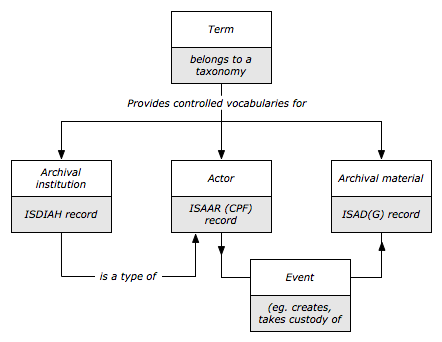Difference between revisions of "Entity types"
| Line 50: | Line 50: | ||
| − | An [[Archival institution|archival institution | + | An [[Archival institution|archival institution]] is an '''actor''' that holds '''archival materials'''. Like all actors, it has its own ISAAR [[Authority record|authority record]]. But its characteristics as a ''repository'' (e.g. its opening hours, research services, contact information) are described separately in an ISDIAH institution record. The ISDIAH elements that are inherited from its ISAAR authority record are: |
*Authorized form of name | *Authorized form of name | ||
Revision as of 16:58, 6 June 2008
Please note that ICA-AtoM is no longer actively supported by Artefactual Systems.
Visit https://www.accesstomemory.org for information about AtoM, the currently supported version.
Entity types
Main Page > (UM) User manual > UM-1 System overview > UM-1.3 Entity types
Users deal with four main types of entity in ICA-AtoM:
Note that ICA-AtoM's architecture includes other entity types, but from the users' point of view these will be the primary ones with which they interact.
Archival descriptions
- Provide contextual information about archival materials.
- Are aranged into hierarchical levels (fonds, series, files, items).
- Include data elements based on the ICA's General International Standard Archival Description (ISAD-G).
Authority records (actors)
- Provide descriptions of the actors (corporate bodies, persons and families) that interact with archival materials as creators, custodians, subjects access points, etc.
- Include data elements based on the ICA's International Standard Archival Authority Records (Corporate bodies, Persons, Families) (ISAAR(CPF)).
Archival institutions
- Provide descriptions of repositories that preserve and provide access to archival materials.
- Include data elements based on the ICA's International Standard for Describing Institutions with Archival Holdings (ISDIAH).
Terms
- Provide controlled vocabularies (functions, subjects, places) used throughout the system (e.g. as access points or in drop-down value lists).
- Are organized into separate taxonomies.
- Include minimal data elements; a future iteration of ICA-AtoM will extend one such taxonomy ("Function description") to include the elements found in the ICA's International Standard For Describing Functions (ISDF).
Actors (corporate bodies, persons, families) are described in ISAAR(CPF) authority records. Actors can be creators, custodians and subjects of the material described in archival descriptions. These relationships are registered as ICA-AtoM events delimited by start / end dates. Through events, 1 actor can have 0, 1 or many relationships to 0, 1 or many archival materials; and 1 archival unit can have 0, 1 or many relationships to 0, 1 or many actors. Event relationships link ISAAR authority files (descriptions of actors) and ISAD records (descriptions of archival materials).
An archival institution is an actor that holds archival materials. Like all actors, it has its own ISAAR authority record. But its characteristics as a repository (e.g. its opening hours, research services, contact information) are described separately in an ISDIAH institution record. The ISDIAH elements that are inherited from its ISAAR authority record are:
- Authorized form of name
- Other forms of name
- Parallel forms of name
- History
- Administrative structure
